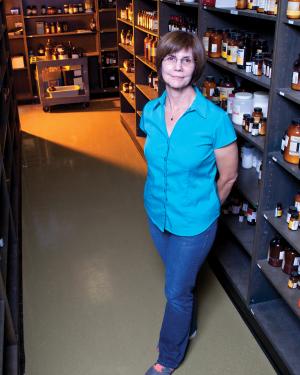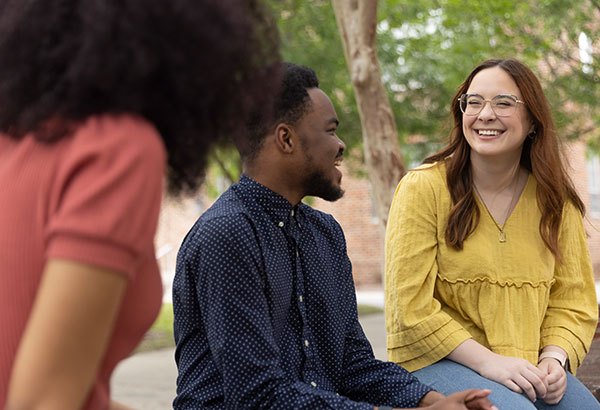Debra Dolliver
President's Award for Excellence in Faculty Service
Service her commitment to Southeastern and students
When members of the faculty in the Department of Chemistry and Physics recognized the need for some essential new equipment, one person was quick to volunteer for the time- consuming task of writing the grants.

Phase-one construction of the new student union addition is nearing completion.
Organic chemist Debra Dolliver stepped up and assumed the leadership position of getting the grant applications written. For her efforts in leading these tasks, as well as her recruitment, retention and extensive mentoring work with students, Dolliver was named the recipient of the 2014 President's Award for Excellence in Faculty Service.
It is the second time she has been honored with a President's Award for Excellence, having earned one for teaching in 2010.
A former English major with a degree from the University of North Texas, Dolliver made the move to chemistry several years later, earning an undergraduate degree in chemistry and a master's degree in organic chemistry from Texas Woman's University. She received her doctorate from the University of North Texas.
"She is an unofficial leader of the chemistry and physics faculty by virtue of her service," says Gerard Blanchard, head of the Department of Chemistry and Physics. "When she realizes something must be done, she starts doing it, and others join in, participating of their own free will because they see the value of the activity."
"Most of our department's analytical instruments were acquired through donations from industry or other universities," said Dolliver, a member of the faculty since 2001. "As a matter of maintaining accreditation, our students must have access to certain modern pieces of equipment.
It was pretty apparent that a concerted push was needed to replace most of the analytical instrumentation to adequately educate our students in the chemistry techniques of today."
Both grants were successful, resulting in a new gas chromatography mass pectrometer funded by the Louisiana Board of Regents for $88,500 and a new $274,000 nuclear magnetic resonance spectrometer funded by the National Science Foundation.
Dolliver said the new instruments will have long-term positive impacts on the university and the department.
"The equipment allows continued excellence in undergraduate research and a high level training," she explained. "They also help produce graduates who have exposure to state-of-the-art instrumentation and techniques that allow them to find placement in top tier graduate and professional positions."
Dolliver is credited with developing and planning the department's annual recruitment program called CaPPS (Career Paths in Physical Science), a half day workshop to educate prospective chemistry and physics students, high school career counselors and others about opportunities in science and technology fields.
A highly regarded researcher who involves her students in her own research, Dolliver has volunteered to supervise students in a chemistry capstone course, for which the instructor receives no teaching credit.
"The course is required for several of our degrees. Students must complete a research project and write a research paper on their work that is as close to publication quality as possible," she explained. "Teaching the course requires the instructor to supervise the students' work closely, which generally means working directly with them in the lab."
Dolliver has supervised 16 students in the research course over the past 10 years, more than any other member in the department. To ensure the quality of the student's work, she organized a committee to analyze the research produced by students each semester to make sure their work meets specific standards.
"I consider it part of my commitment to giving Southeastern students exceptional training and experience," she added.
That commitment also includes accompanying and supervising students at national or regional scientific meetings. Over the years, she has taken students to more than 25 conferences sponsored by organizations such as regional and national meetings of the National American Chemical Society and the Rice University Undergraduate Invitational Symposium. Her efforts included procuring funding, making travel arrangements and supervising the students' scientific presentations.
Blanchard said Dolliver's service includes chairing and serving on several committees for the College of Science and Technology and for the university, including service as a member of the Faculty Senate, the University Planning Council, the departmental Chemistry Curriculum Committee and the Intradepartmental Strategic Planning Committee.
"Dr. Dolliver's activities represent a major expenditure of effort that go beyond her teaching and research responsibilities," said Blanchard. "They are strictly of a service nature and will have a lasting benefit for Southeastern and our students."






